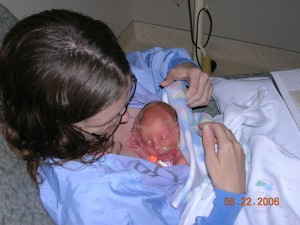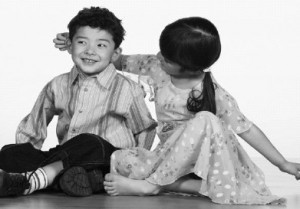By Jack Newman, MD, & Teresa Pitman
 We now have a multitude of studies that show mothers and babies should be together, skin-to-skin (baby naked, not wrapped in a blanket), the baby’s neck extended slightly so his head is in “sniffing position,” immediately after birth – and they should spend as much time together skin-to-skin as possible in the days that follow. The baby is happier, the baby’s temperature is more stable and more normal, the baby’s heart and breathing rates are more stable and normal, and the baby’s blood sugar levels are better.
We now have a multitude of studies that show mothers and babies should be together, skin-to-skin (baby naked, not wrapped in a blanket), the baby’s neck extended slightly so his head is in “sniffing position,” immediately after birth – and they should spend as much time together skin-to-skin as possible in the days that follow. The baby is happier, the baby’s temperature is more stable and more normal, the baby’s heart and breathing rates are more stable and normal, and the baby’s blood sugar levels are better.
Not only that – skin-to-skin contact immediately after birth allows the baby to be colonized by the same bacteria as the mother. This, plus breastfeeding, are thought to be important in the prevention of allergic diseases. When a baby is put into an incubator, his skin and gut are often colonized by bacteria different from his mother’s and studies show that the baby is much more likely to adjust to his new world, metabolically speaking, when he is skin-to-skin with the mother than if he is in that incubator.
We now know that this is true not only for the baby born at term and in good health but also for the premature baby. Skin-to-skin contact and Kangaroo Mother Care can contribute much to the care of the premature baby. Even babies on oxygen can be cared for skin-to-skin, and this helps reduce their need for oxygen and keeps them more stable in other ways as well.
From the point of view of breastfeeding, babies who are kept skin-to-skin with the mother immediately after birth for at least an hour are more likely to latch on without any help, and they are more likely to latch on well, especially if the mother did not receive medication during labor or birth. Putting mother and baby skin-to-skin can also be a valuable first step in solving any breastfeeding difficulties they are having.
There is no reason that the vast majority of babies cannot be skin-to-skin with the mother immediately after birth for at least an hour. Hospital routines, such as weighing the baby, should not take precedence. Of course, there is also no reason a baby cannot be back skin-to-skin with the mother immediately after the hospital routines are done.
The baby should be dried off and put on the mother. Nobody should be pushing the baby to do anything; nobody should be trying to help the baby latch on during this time. The mother, of course, may make some attempts to help the baby, usually in response to the baby’s behaviors showing some interest in going to the breast, and this should not be discouraged. The mother and baby should just be left in peace to enjoy each other’s company. The mother and baby should not be left alone, however, especially if the mother has received medication. It is important that not only the mother’s partner but also a nurse, midwife, doula, or physician stay with them – occasionally, some babies do need medical help and someone qualified should be there “just in case.”
The eye drops and the injection of vitamin K can wait a couple of hours. By the way, immediate skin-to-skin contact can also be done after Cesarean section, even while the mother is getting stitched up, unless there are medical reasons that prevent it.
Studies have shown that even premature babies as small as 1200 grams (2 pounds 10 ounces) are more stable metabolically, including the level of their blood sugars, and breathe better if they are skin-to-skin immediately after birth. The need for an intravenous infusion, oxygen therapy, or a nasogastric tube, for example, or all the preceding, does not preclude skin-to-skin contact. Skin-to-skin contact is quite compatible with other measures taken to keep the baby healthy.
Of course, if the baby is quite sick, the baby’s health must not be compromised, but any premature baby who is not suffering from respiratory distress syndrome can be skin-to-skin with the mother immediately after birth. Indeed, in the premature baby, as in the full-term baby, skin-to-skin contact may decrease rapid breathing into the normal range.
Even if the baby does not latch on during the first hour or two, skin-to-skin contact is still good and important for the baby and the mother for all the other reasons mentioned.
I have heard of a few cases where a mother had planned not to breastfeed but was still urged by hospital staff to hold her baby skin-to-skin. After doing this for a short period of time and seeing her baby gravitate to her breast, these mothers decided to breastfeed after all. The effects of this simple technique are powerful! In fact, one could say that skin-to-skin contact is even more important if the mother does not breastfeed so that the mother and baby have this special opportunity to “fall in love with each other.”
The Case for Skin-to-Skin Contact Between Mother and Baby, Whether Full-term or Premature
In summary, skin-to-skin contact immediately after birth that lasts for at least an hour has the several positive effects. These babies:
- Are more likely to latch on, and to latch on well.
- Have more stable and normal skin temperatures.
- Have more stable and normal heart rates and blood pressures.
- Have high blood sugars.
- Are less likely to cry.
- Are more likely to breastfeed exclusively longer.
Excerpted from The Latch and Other Keys to Breastfeeding Success by Newman, J., and Pitman, T. (2006) Amarillo, TX: Hale Publishing. (pp. 9-12) www.ibreastfeeding.com
 “Mommy, why do you need another Yonatan?” asked my first-born, looking at my growing belly. I hugged him and said, “I do not need another Yonatan. There is no other Yonatan. You are the only ‘you’ there will ever be, and I love you so much.”
“Mommy, why do you need another Yonatan?” asked my first-born, looking at my growing belly. I hugged him and said, “I do not need another Yonatan. There is no other Yonatan. You are the only ‘you’ there will ever be, and I love you so much.”
